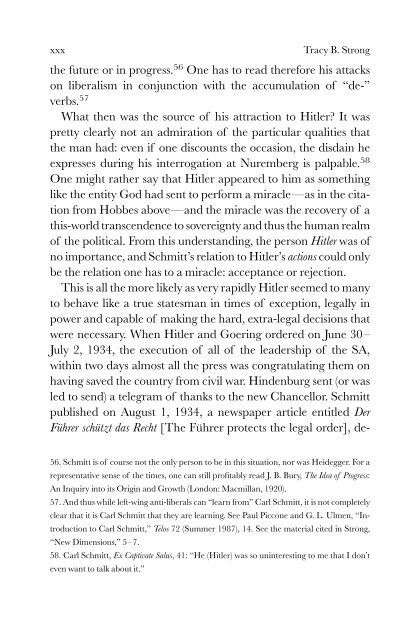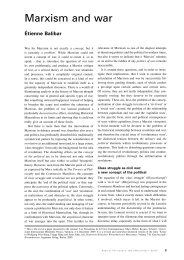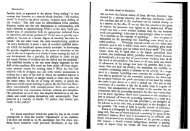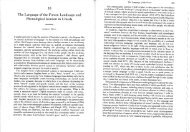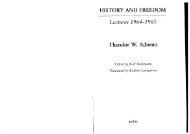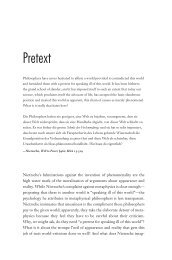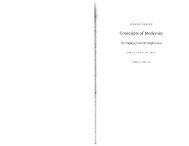Schmitt-Political Theology I.pdf - Townsend Humanities Lab
Schmitt-Political Theology I.pdf - Townsend Humanities Lab
Schmitt-Political Theology I.pdf - Townsend Humanities Lab
Create successful ePaper yourself
Turn your PDF publications into a flip-book with our unique Google optimized e-Paper software.
xxx Tracy B. Strong<br />
the future or in progress. 56 One has to read therefore his attacks<br />
on liberalism in conjunction with the accumulation of “de-”<br />
verbs. 57<br />
What then was the source of his attraction to Hitler? It was<br />
pretty clearly not an admiration of the particular qualities that<br />
the man had: even if one discounts the occasion, the disdain he<br />
expresses during his interrogation at Nuremberg is palpable. 58<br />
One might rather say that Hitler appeared to him as something<br />
like the entity God had sent to perform a miracle—as in the citation<br />
from Hobbes above—and the miracle was the recovery of a<br />
this-world transcendence to sovereignty and thus the human realm<br />
of the political. From this understanding, the person Hitler was of<br />
no importance, and <strong>Schmitt</strong>’s relation to Hitler’s actions could only<br />
be the relation one has to a miracle: acceptance or rejection.<br />
This is all the more likely as very rapidly Hitler seemed to many<br />
to behave like a true statesman in times of exception, legally in<br />
power and capable of making the hard, extra-legal decisions that<br />
were necessary. When Hitler and Goering ordered on June 30–<br />
July 2, 1934, the execution of all of the leadership of the SA,<br />
within two days almost all the press was congratulating them on<br />
having saved the country from civil war. Hindenburg sent (or was<br />
led to send) a telegram of thanks to the new Chancellor. <strong>Schmitt</strong><br />
published on August 1, 1934, a newspaper article entitled Der<br />
Führer schützt das Recht [The Führer protects the legal order], de-<br />
56. <strong>Schmitt</strong> is of course not the only person to be in this situation, nor was Heidegger. For a<br />
representative sense of the times, one can still profitably read J. B. Bury, The Idea of Progress:<br />
An Inquiry into its Origin and Growth (London: Macmillan, 1920).<br />
57. And thus while left-wing anti-liberals can “learn from” Carl <strong>Schmitt</strong>, it is not completely<br />
clear that it is Carl <strong>Schmitt</strong> that they are learning. See Paul Piccone and G. L. Ulmen, “Introduction<br />
to Carl <strong>Schmitt</strong>,” Telos 72 (Summer 1987), 14. See the material cited in Strong,<br />
“New Dimensions,” 5–7.<br />
58. Carl <strong>Schmitt</strong>, Ex Captivate Salus, 41: “He (Hitler) was so uninteresting to me that I don’t<br />
even want to talk about it.”


